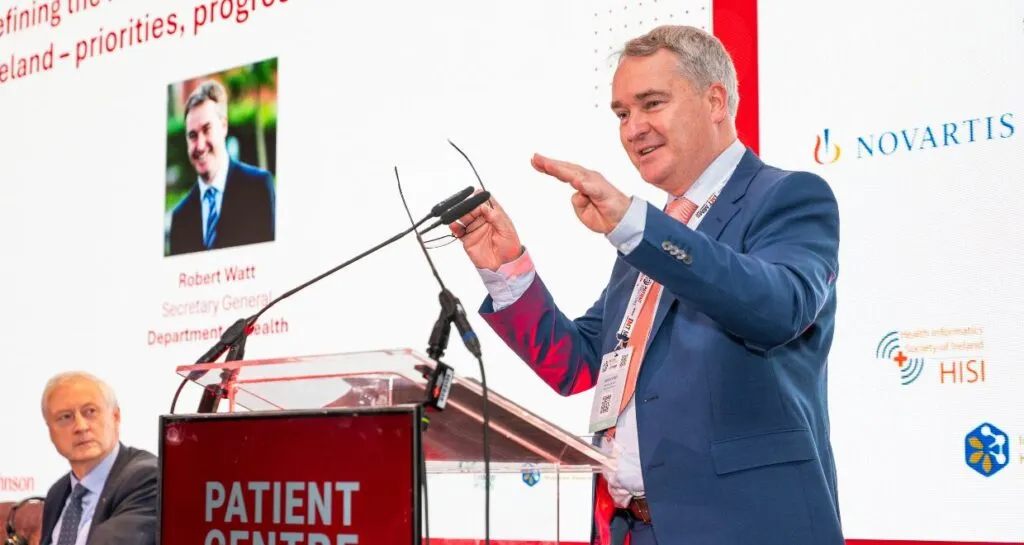Copyright imt

The planned introduction of a Shared Care Record (SCR) into the healthcare system is the digital health initiative which has the potential to have the widest impact, the Secretary General of the Department of Health has said. Speaking at Patient Solutions, a new conference dedicated to identifying and implementing practical, scalable solutions that enhance patient care and outcomes, Robert Watt told delegates that the way SCR will transform patient care will be ‘profound’. “Just think of all the times people turn up in an A&E and have to tell their story again, and different healthcare providers are finding out what is the issue with you… All the time that we are spending, wasteful time,” he said in conversation with Prof Martin Curley. “If we had a shared care record where the healthcare providers could look on an app and say, ‘this is Martin’s issue, this is the last time you had interaction, and he’s had some relapse or he’s had some new problem’ – just think of the efficiency gain.” He added: “I think this is actually probably the biggest, the most impactful change we can bring about. It’s going to take us probably another year to 18 months. We’re trialling it in some regions now, and if we can crack this shared care record, I think it’s going to be profound.” Referring to the publication of hospital productivity data, Mr Watt said it’s release ‘upset’ some sites, but argued that the only people who should be upset are patients waiting for care. He also said that the debate around healthcare funding should be more focused on how resources are used rather than the overall cost. When asked by Prof Curley whether it was a difficult decision to openly publish data on hospital productivity, which includes the average number of appointments undertaken by consultants in hospitals around the country, Mr Watt said that it was necessary in order to give a broader picture of the Irish healthcare system. “Ultimately, it’s good for us to inform the debate,” he said. “There’s a lot of discussion about healthcare, because it affects all of us, and it’s normally one of the biggest political issues at any given time, so we feel it’s an obligation on us to help that debate. “A debate that was just focused on resources, rather than what we’re doing with all the resources, is the wrong debate. The debate needs to be more about what we’re doing with all the resources we have,” he added. Referring to the publication of productivity figures, he said: “Some people got very upset about it, and I had to go and talk to some hospitals. “I don’t quite understand why people get upset about it. The only people who should get upset are the patients waiting for care, in my view. “An administration shouldn’t get upset if we’re developing some analysis, because people might find it a bit uncomfortable. That’s just tough, isn’t it?” When asked about data released by Irish Medical Times which showed that, in the last four years, almost one million patient appointments were cancelled by hospitals, Mr Watt said the key concern of his Department is that people have access to care. He said that, in the first nine months of this year the health service managed 5.8 million episodes of care compared to 4.8 million five years ago. The number of day cases being carried out has also increased by between 13 and 14 per cent, while there has been an 8-9 per cent rise in inpatient activity. “We are increasing the supply. We are doing more procedures but of course the demand is growing all the time,” he said. “I think some of the cancellations this time of the year could be because of the interface between unscheduled care and scheduled care. We have people turning up at A&E’s and there is congestion there and we need to keep beds for those urgent cases. That is part of the challenge.”



